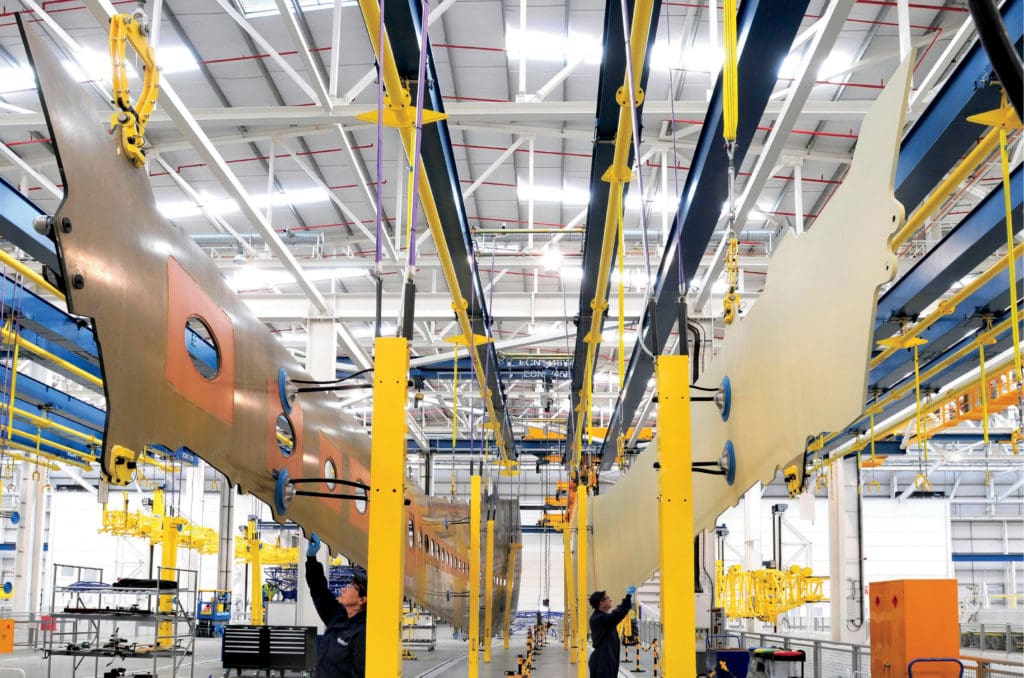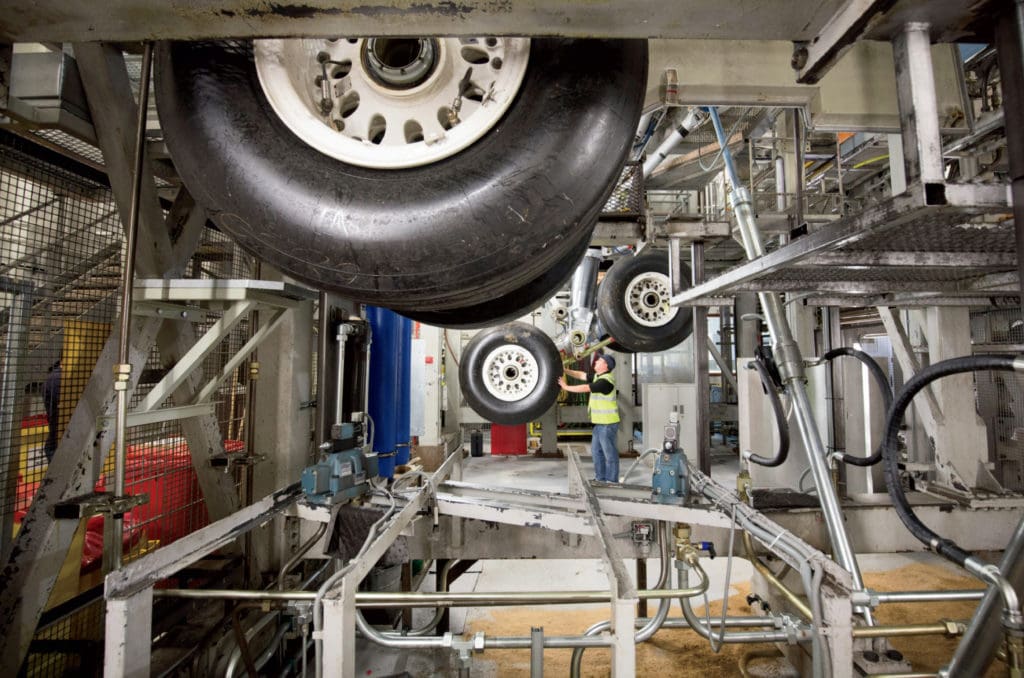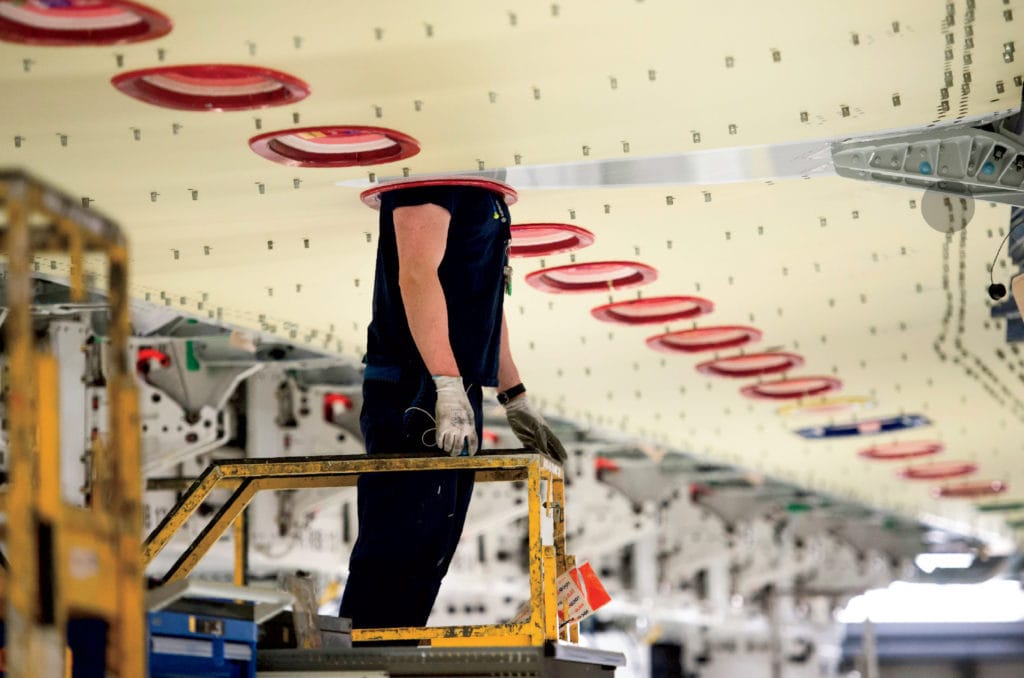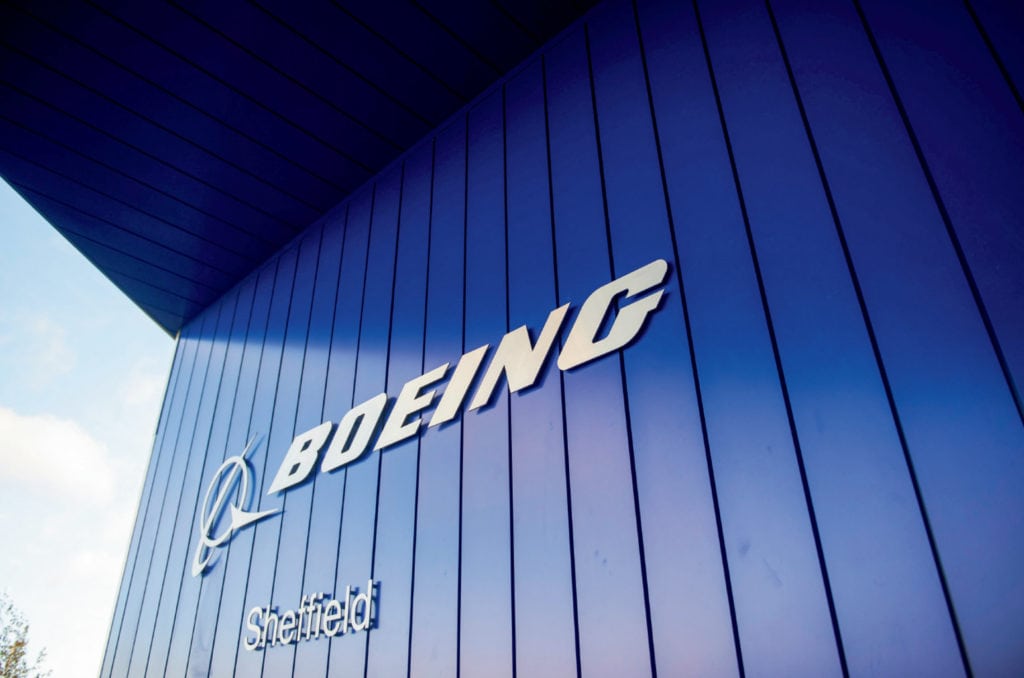Deal or no deal: The aerospace industry braces for the impact of Brexit.
Times are good for aviation. In the next 20 years, air traffic is forecasted to double, generating demand for more than 37,000 new passenger and cargo aircraft, worth $5.8 trillion. Few countries, at face value, should benefit more from a prolonged global aerospace boom than the United Kingdom (UK), with its world-class aerospace manufacturing sector and highly globalized business-friendly economy.
According to ADS Group, a trade organization representing companies in the UK aerospace, defense, security and space sectors, the aerospace sector was a huge contributor to the UK’s 2017 economic output. It contributed $46 billion (£35 billion) to British exports and directly employed 123,000 people. Why then are UK-based firms now holding back on investment decisions and, in some cases, moving part of their operations out of the country?
The answer is of course Brexit. More precisely, the uncertainty and looming specter of a “no-deal” Brexit: the possibility of the UK leaving the European Union (EU) without any arrangements to govern trade with its biggest partner after midnight on March 29.
Tom Enders, CEO of Airbus, said in a recorded video message in January that the British government’s handling of the Brexit negotiations had been a “disgrace,” because businesses could not plan properly two years after Britain voted to leave the EU. Airbus, which has 25 locations in the UK, could leave if there was no deal, he warned. “Please don’t listen to the Brexiteers’ madness which asserts that because we have huge plants here, we will not move, and we will always be here. They are wrong,” he said.
Those keen on Brexit often dismiss claims about leaving the EU as scaremongering, using the term “Project Fear.” In this particular instance, David Bannerman, a Conservative member of the European Parliament (MEP) tweeted at the time that Enders’ warning amounted to “super Project Fear.” But will the likes of Airbus and Rolls-Royce really just pack up and leave the day after March 29?
“In 2017, the UK’s aerospace sector contributed $46 billion to British exports and directly employed 123,000 people.” – ADP Group
According to Jeegar Kakkad, chief economist and director of Policy at ADS Group, the effects of Brexit are already being felt, but nothing will change dramatically overnight. “While the global deliveries from Airbus and Boeing and others is up eight percent, the UK sector was looking pretty flat in terms of output for 2018,” he says, noting that this is despite buoyant worldwide demand for wide- and narrow-body aircraft.
“The first thing we’ll see [after Brexit] is stagnation rather than significant job losses or turnover,” Kakkad says. “Making wings and engines – that activity doesn’t move very quickly. But what does happen is you stop investing in those sites, you stop placing contracts with UK suppliers, and that slowly erodes the competitiveness of the sites in the sector over time.”

Professor Keith Hayward, head of Research and a Fellow of the Royal Aeronautical Society in the UK, makes a similar point: “Brexit is not likely to affect things that are in place. The real issue is stuff that might be considered as future investments from 2020 onward. It’s not what happens to the A350, the A320 or the A380, it’s what happens to a putative A390, the next one in the chain. If investment in that program goes entirely outside of the United Kingdom, then the UK supply chain will suffer.”
“Brexit is not likely to affect things that are in place. The real issue is stuff that might be considered as future investments from 2020 onward.” – Professor Keith Hayward, Royal Aeronautical Society
But Brexiteers like to highlight that aircraft components won’t be subject to tariffs no matter the outcome of Brexit, because they are exempt under World Trade Organization rules, which Britain would fall back on in the event there is no deal. Nigel Farage, an MEP and former leader of the United Kingdom Independence Party, made this point on his LBC radio show, last summer, saying based on this, Airbus’ argument “falls to pieces.”

Tariffs are not and have never been the issue, according to Hayward. “There’s not an issue about suddenly discovering the parts in the UK are 15 percent more expensive, or five percent more expensive than the day before. The issue is delay.” He says Airbus likely won’t have problems moving big parts around by air, such as transporting a complete wingbox from North Wales to Toulouse or Hamburg. However, he says there could be customs holdups for the smaller components that are being trucked from France and Germany to complete wing assemblies at Airbus UK’s assembly line in Filton, close to Bristol in the southwest of England.
Under existing rules, companies importing into the UK from other EU countries have to fill in short forms with four or five fields online, declaring the value of the goods for statistical purposes. “If there’s no deal, they will have to fill in 54 separate fields of data 12 times over to have one shipment go across the border,” Kakkad says.

Preparing for such a scenario, Airbus, which has 4,000 companies in its UK supply chain, began Brexit contingency plans in July of last year to build up buffers. Rolls-Royce CEO Warren East told Reuters in November that his company’s contingency plan includes stockpiling components so that it would have the “logistical capacity” to continue doing business.
While it’s already hard for Airbus and some of the other bigger companies to stockpile, it becomes even more difficult as you move down the tiers of the supply chain, Kakkad says. This is because small- and medium-sized enterprises don’t have the resources or the working capital cash flow to be able to invest in buffer stocks or to accrue additional raw materials. “They’re not able to do as much as the big companies,” he says.
Companies of all sizes are also grappling with the regulatory changes that a hard Brexit would entail. Under a no-deal scenario, the certification of the design of aircraft parts, production and maintenance will no longer fall under the auspices of the European Aviation Safety Agency (EASA).
Some firms are preparing for this by shifting where they do their safety certifications to countries such as Ireland and Germany. Others are applying for EASA’s Third Country Operators status to ensure that their activities in the UK are still recognized and governed by the safety regime in Europe.

While Airbus is threatening to leave the UK, its rival Boeing opened its first-ever European manufacturing facility in October last year, an aircraft parts factory in Sheffield, England, that will supply components for the 737 and 767 aircraft families.
This opening serves as evidence among Brexit supporters that Britain remains a globally attractive place for aerospace. “If Boeing can operate a slick production process using parts made in Britain, shipped six times the distance to their assembly line compared to shipping Airbus parts from Bristol or North Wales to Hamburg or Toulouse, what is Airbus’ problem? The answer lies not in economics but in politics,” wrote Sir Gerald Howarth, a Brexit-supporting former Conservative MP and government minister, on the website BrexitCentral. Is this a valid point?
“I think what the Brexit MPs miss is the scale of investment: Boeing’s going from a minimal kind of footprint in the UK and growing up.” – Jeegar Kakkad, ADS Group
“I think what the Brexit MPs miss is the scale of investment: Boeing’s going from a minimal kind of footprint in the UK and growing up,” Kakkad says. Because Boeing is governed by the Federal Aviation Authority (FAA) in the United States, its regulatory concern is to ensure the FAA and the UK’s Civil Aviation Authority recognize each other’s competency to do safety certifications. “So, as long as that relationship is built up, Boeing is less exposed than Airbus to the consequences of Brexit,” he says.
Boeing has invested $52 million (£40 million) in its Sheffield facility and now employs 52 people, including mechanics, engineers and more than 20 apprentices. As Kakkad notes, this is a small presence compared to that of Airbus in the UK. A study by Oxford Economics published in June 2017 calculated that Airbus contributed $10 billion (£7.8 billion) to the UK’s economic output in 2015. It directly employs 14,000 people, and its supply chain supports a further 117,400 jobs. “This means £1 in every £400 collected by the UK government can be attributed to Airbus’ activity,” the authors wrote.
Do Brexit-supporting politicians or people in government fully grasp this? Hayward says that while some of his contacts in UK’s Department for Business, Energy and Industrial Strategy are aware, there is a “profound ignorance” in political circles about the nature of how the industry works.
“There is a sort of belief – and I think ‘belief’ is the correct word – that all things will improve, which doesn’t really tie in with the realities on the ground of these complex industries,” Hayward says, adding that Brexiteers fail to appreciate what industrial globalism really means and have lost track of the value of economic interdependence. “They certainly don’t recognize the absurdity of giving up access to the largest single market in the world and saying things like, ‘Oh well, we’ll fill it up with the faster-growing areas in the Far East.’ The logic of that escapes me,” he adds.
As a top-line response, Kakkad says the ADS Group doesn’t see any natural opportunities in Brexit. But could leaving the world’s largest single market perhaps make UK aerospace firms more resilient, stronger and leaner? “Maybe. It could lead to consolidation within the supply chain, stuff moving [to the UK] from Europe, or potentially even stuff moving from the UK to the EU 27,” he says. “How we respond, in terms of making the UK a globally attractive place to invest, will determine whether out of the ashes of Brexit something new or strong arises.”
Kakkad thinks this includes ensuring the UK is at the forefront of new technologies like electric aircraft or flying taxis and the urban air mobility movement. “The point is, we can be doing that anyway, and we should’ve been doing that anyway, and Brexit shouldn’t be the reason why we do it.” As for Hayward, he doesn’t see any grounds for optimism in the event of a hard Brexit. “There are no positive returns from a hard Brexit for the aeronautics sector, for aerospace manufacturing in this country. Not a single jot.”
“Chain Reaction” was originally published in the 9.2 April/May issue of APEX Experience magazine.


